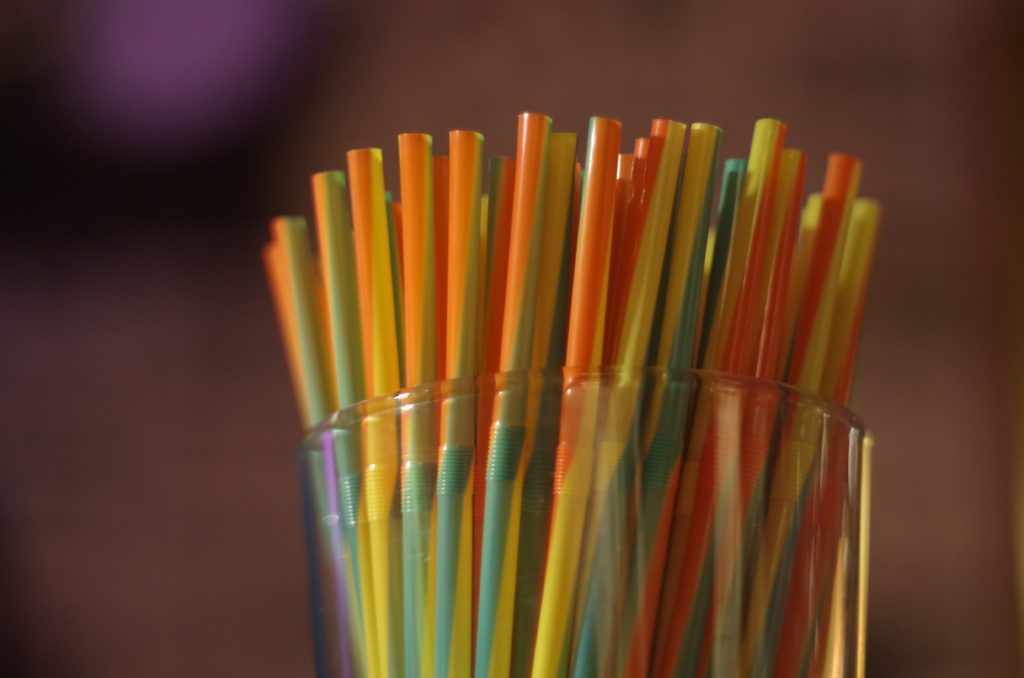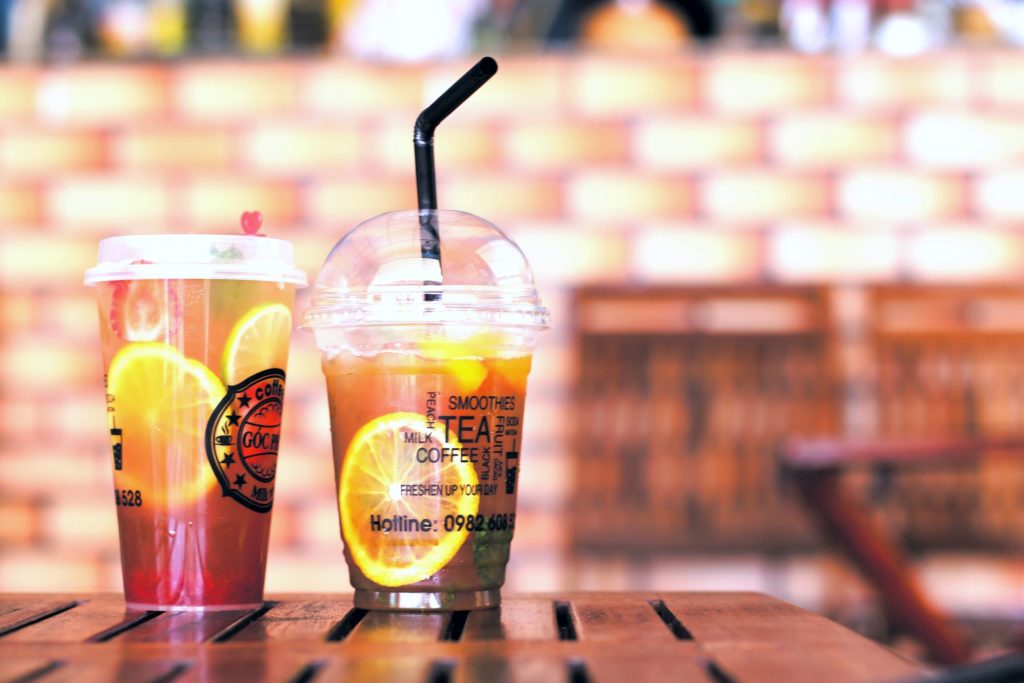Can plastic straw bans balance the health of our planet with the needs of people with disabilities?
 June 24, 2019
Category: Featured, Long, Purpose
June 24, 2019
Category: Featured, Long, Purpose
Editor’s note: Unless it’s a direct quote, this article uses person-first language at the preference of Todd Collura, the primary interviewee.
“Paper straws get destroyed, they disintegrate,” said Todd Collura, a Philadelphia resident living with a rare syndrome called Paraneoplastic Cerebellar Degeneration Anti-TR.
(You can read Collura’s detailed description of this syndrome on his blog.) “I can’t control my jaw … I shake. So I destroy [paper straws].”
Tremors are a symptom of Collura’s condition, which is why he needs plastic straws over paper. Collura is one of many people with disabilities who are concerned about the impact efforts to reduce or get rid of plastic straws will have on his ability to drink liquids.
Some alternatives aren’t cost effective and feel, to Collura, like “a tax on disabled people.” (Even one of the closest in functionality and cost, plant-based straws, are still almost twice as expensive: $13-15 for 1,000 plastic straws versus $21-27 for the same number of plant-based straws on Amazon and Uline.)
Other solutions, like reusable straws, aren’t safe for those with compromised immune systems, which was the case for Collura when he underwent chemotherapy. He depended on plastic straws to drink.
Collura is not alone in his concern. There’s been pushback from groups of people with disabilities, both online and from organizations in cities like Seattle and New York City, to make sure the needs of people with motor impairments are recognized in the campaign to reduce the consumption of single use plastics.
However, efforts to reduce single use plastic consumption are one of the ways environmental activists are trying to mitigate what Logan Welde, a lawyer for the Clean Air Council, calls a “climate emergency.”
The future of single-use plastics in Philadelphia
Recently, Councilman Mark Squilla introduced a bill to ban some plastic and paper bags in an effort to reduce the carbon footprint caused by the creation and transportation of bags and litter on waterways, wildlife, infrastructure, and city streets.
Welde, meanwhile, already has legislation drafted to reduce consumption of other single-use plastics and styrofoam, including cutlery, take-out containers, and straws.
Welde hopes a significant reduction in those materials will not just improve the environment in and around Philadelphia, but also reduce infrastructure costs that arise from the impact of single-use plastic. Philadelphia can benefit from less litter, fewer clogged drains, and less wear and tear on roads, according to Welde.
On top of that, Welde emphasized the direct health benefits for people as well. For example, while the long-term health effects aren’t clear, a meta-analysis by the University of Newcastle, Australia undertaken for the World Wildlife Fund for Nature found that humans ingest an estimated 5 grams of plastic a week — roughly the size of a credit card. Cutting down on plastic production can help cut back on where plastic ends up, including our waterways and our own bodies.
Welde acknowledged the health benefits of a full- or partial-ban on plastic straws while understanding that accommodations must be put in place for people with disabilities.
“I think legislation should reflect people’s needs for some accommodations. So I don’t think that we as a society should say, ‘Hey, disabled community, this is where you just need to stop drinking fluids,’” Welde said.
He stressed that legislation can balance getting the estimated 95% of the population for whom plastic straws are superfluous items to stop using them while protecting the needs of those who do need them daily.
Welde said that future legislation drafted by the Clean Air Council will likely only require customers to ask for a straw instead of receiving one by default. “A customer doesn’t need to say they have a disability, they can just ask for a straw.”
He hopes we can work to improve our planet’s health — and consequently everyone’s health — while making sure the health needs of people with disabilities are met.
Concerns over implementation
While Welde wishes he could snap his fingers and eliminate single-use plastics immediately, Collura wants legislation to address other plastics first, and focus on straws last.
That’s a position put forth by other advocates for people with disabilities, like Alice Wong, founder of the Disability Visibility Project, who suggested businesses minimize other single-use plastics before straws.
Collura is skeptical about the impact on folks with disabilities when a city or even a large chain, like Starbucks, works to eliminate plastic straws. “People at the top put a policy in place,” he said, “I don’t think the frontline employees will always give straws on request.”
Collura also expressed concern for people with an invisible disability, and how they might be treated by employees of retail food and beverage businesses after a straw ban.
Legislation in Seattle that banned single-use plastic straws but allowed for businesses to provide them for people with disabilities, seems to confirm Collura’s apprehensions about any legislation around plastic straws. The Seattle Commission for People with disAbilities conducted an informal survey of about 15 restaurants and found that none of them had plastic straws on hand after the ban was implemented.
A small sample size, yes, but hopefully a lesson environmental activists in Philadelphia can consider as they draft legislation.
Need for innovation remains
A leading alternative for plastic straws appears to be compostable, plant-based straws which are already available at some Philadelphia businesses, like Hip City Veg and OCF Coffee House. However, the environmental impact of switching to plant-based straws, often made from corn, only really works if they end up being composted, since they can muck up recycling process.
Plant-based straws seem to offer the most similar functionality to plastic straws while being cheaper than less desirable options (such as paper). However, plant-based straws are close to useless in hot beverages.
Collura is able to drink hot beverages as long as he has a lid and is seated at a table but that’s not the case for everyone with a disability. Watch what happens to this compostable straw from OCF Coffee House when hot water is added:
People with a motor impairment that causes their hands and/or head to shake should be able to drink hot coffee without risk of injury and currently that requires a plastic straw. Paper, as Collura shared, isn’t durable enough. Other types of straws have drawbacks as well.
A truly environmentally friendly replacement for plastic has yet to be found.
Until that perfect alternative is found, Welde hopes people with disabilities help draft legislation proposals.
“We want to hear from people situated in those communities with disabilities, or other abilities, to be able to say, ‘This is a concern you should address in this legislation.’”
Trending News












